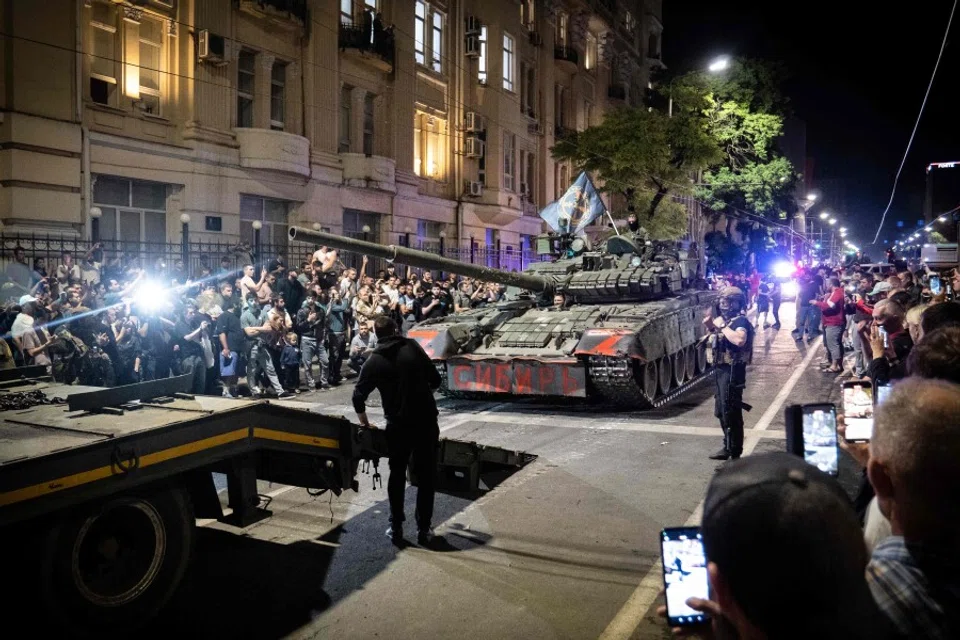Wagner mutiny: China showing dissatisfaction to a weakened Putin
While Russian Deputy Foreign Minister Andrei Rudenko visited Beijing seeking a reassurance of support soon after Wagner head Yevgeny Progozhin's attempted coup, China seems to be adopting a wait-and-see attitude.

On 24 June, an attempted coup was launched by Yevgeny Prigozhin, head of the Russian private military company Wagner Group, only for the situation to turn dramatically within 24 hours.
Amid the dramatic upset in the Russian mutiny against Russian President Vladimir Putin, Russian Deputy Foreign Minister Andrei Rudenko landed in Beijing on 25 June, meeting with Chinese State Councilor and Foreign Minister Qin Gang. That same day, the Chinese foreign ministry asserted that China "supports Russia in maintaining national stability".
Interviewed academics think that Russia no doubt hoped that China would reaffirm its support for Russia through the meeting, while China wanted to get a clearer picture of the actual circumstances of the mutiny and how Putin would handle the potentially serious consequences of the incident.

Based on information on the Chinese foreign ministry website, Qin and Chinese vice-minister of foreign affairs Ma Zhaoxu met Rudenko separately on 25 June.
Calming the situation with support from China
In response to the meeting between Qin and Rudenko, the Chinese foreign ministry only briefly stated that both parties exchanged views on China-Russia relations and international and regional issues of common interest.
However, Russian news agency Sputnik quoted the Russian foreign ministry's statement following the meeting between Rudenko and Qin as saying: "The Chinese side expressed support for the Russian leadership's efforts to stabilise the situation in the country in connection with the events of June 24 and confirmed its interest in strengthening Russia's cohesion and further prosperity."
The Russian foreign ministry emphasised that bilateral relations between Moscow and Beijing were of a "trustworthy nature".
"I believe China wants to know what the exchange conditions were because it is crucial to assess Russia's advantage in the war." - James Dorsey, adjunct senior fellow, RSIS, NTU

Later that night, the Chinese foreign ministry again commented on the Wagner Group incident in a question-and-answer session: "This is Russia's internal affair. As Russia's friendly neighbour and comprehensive strategic partner of coordination for the new era, China supports Russia in maintaining national stability and achieving development and prosperity."
China wants to know how Putin will respond
James Dorsey, an adjunct senior fellow with the S. Rajaratnam School of International Studies at Nanyang Technological University, assessed that even though the coup is over, China still wants to know how much the incident has weakened Putin's authority and how he will respond.
He said: "It is hard to imagine that Prigozhin would reach an agreement with Putin to evacuate to Belarus without getting anything in return. I believe China wants to know what the exchange conditions were because it is crucial to assess Russia's advantage in the war."
Beijing is using the current situation to send a signal of China's dissatisfaction to a weakened Putin, which he believes will be heard "loud and clear" in Moscow. - James Dorsey
China is one of Russia's most important partners, and their close relationship has been under scrutiny by Western countries since the outbreak of the war in Ukraine. However, Chinese officials did not express support for the Russian government or criticise the Wagner Group when the coup first started, which raised speculation. Dorsey pointed out that the final statement from the Chinese Ministry of Foreign Affairs expressing "support for Russia in maintaining national stability" did not mention Putin's name, indicating support for Russia without specifically endorsing Putin.
Dorsey concluded that Beijing has been caught in a dilemma due to Russia's invasion of Ukraine, and Beijing is using the current situation to send a signal of China's dissatisfaction to a weakened Putin, which he believes will be heard "loud and clear" in Moscow.
This article was first published in Lianhe Zaobao as "俄副外长赴北京 中国宣示支持俄罗斯维护稳定未提普京".





![[Photos] Fact versus fiction: The portrayal of WWII anti-Japanese martyrs in Taiwan](https://cassette.sphdigital.com.sg/image/thinkchina/3494f8bd481870f7c65b881fd21a3fd733f573f23232376e39c532a2c7593cbc)